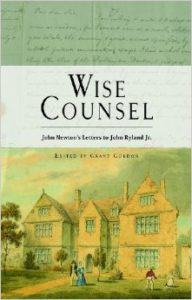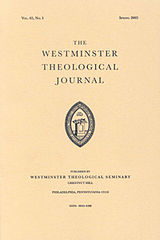Ferguson, Sinclair B. The Whole Christ: Legalism, Antinomianism, and Gospel Assurance—Why the Marrow Controversy Still Matters. Wheaton: Crossway, 2016.
 Sinclair Ferguson uses the Marrow controversy in 18th century Scotland as a historical lens through which to examine the issues of legalism, antinomianism, and assurance. Ferguson’s thesis, as reflected in the title of the book, is that both legalists and antinomians err in separating the benefits of Christ from Christ himself. The solution to both is to not seek the benefits of Christ apart from the person of Christ. In all, this is a helpful book full of interesting history and insightful theology. I think the one improvement could be situating the response of Boston and the Marrow men in the broader context of Reformed theology. Did they respond similarly or differently to these problems than Reformed theologians in other times and places? In the multitude of historical counselors there is oftentimes safety.
Sinclair Ferguson uses the Marrow controversy in 18th century Scotland as a historical lens through which to examine the issues of legalism, antinomianism, and assurance. Ferguson’s thesis, as reflected in the title of the book, is that both legalists and antinomians err in separating the benefits of Christ from Christ himself. The solution to both is to not seek the benefits of Christ apart from the person of Christ. In all, this is a helpful book full of interesting history and insightful theology. I think the one improvement could be situating the response of Boston and the Marrow men in the broader context of Reformed theology. Did they respond similarly or differently to these problems than Reformed theologians in other times and places? In the multitude of historical counselors there is oftentimes safety.

 This is a collection of letters, many previously unpublished, from the Anglican minister John Newton to the Baptist minister John Ryland, Jr. The name of John Ryland, Jr. may be unknown to many, but he was one of the rope-holders for William Carey, who is well-known for his pioneer missionary work in India. The letters begin when Ryland is a young man and continue into Newton’s last years of life. The title of the book captures their nature. These are letters of wise counsel from an older minister to a younger. Since they cover such a long span of time, a whole variety of life’s experiences are commented upon. These are well worth reading and meditation.
This is a collection of letters, many previously unpublished, from the Anglican minister John Newton to the Baptist minister John Ryland, Jr. The name of John Ryland, Jr. may be unknown to many, but he was one of the rope-holders for William Carey, who is well-known for his pioneer missionary work in India. The letters begin when Ryland is a young man and continue into Newton’s last years of life. The title of the book captures their nature. These are letters of wise counsel from an older minister to a younger. Since they cover such a long span of time, a whole variety of life’s experiences are commented upon. These are well worth reading and meditation. This article is the second in a recent trilogy of articles by Poythress on the opening chapters of Genesis. The heart of the article is a step through the creation week with particular attention given to correlations between God’s creation activity and normal providence. For instance, in normal providence heavy rains may cause water to cover dry land. Later the water recedes to show the dry land. This ordinary providence aligns with God’s causing the dry land to appear out of the water in creation. Or, God specially created the animals, but animals are “created” providentially though the normal processes of birth. I thought that Poythress sometimes showed real correlations between creation and providence, but other times I thought he was trying too hard. For instance, he sees a correlation between the original gift of food to eat in Genesis 1:29 and eating of plants today by humans. However, this is a stretch because God’s speech is looking beyond the creation week to the future. It’s not clear that something beyond ordinary providence was ever intended.
This article is the second in a recent trilogy of articles by Poythress on the opening chapters of Genesis. The heart of the article is a step through the creation week with particular attention given to correlations between God’s creation activity and normal providence. For instance, in normal providence heavy rains may cause water to cover dry land. Later the water recedes to show the dry land. This ordinary providence aligns with God’s causing the dry land to appear out of the water in creation. Or, God specially created the animals, but animals are “created” providentially though the normal processes of birth. I thought that Poythress sometimes showed real correlations between creation and providence, but other times I thought he was trying too hard. For instance, he sees a correlation between the original gift of food to eat in Genesis 1:29 and eating of plants today by humans. However, this is a stretch because God’s speech is looking beyond the creation week to the future. It’s not clear that something beyond ordinary providence was ever intended.
 Lloyd-Jones, D. M.
Lloyd-Jones, D. M.